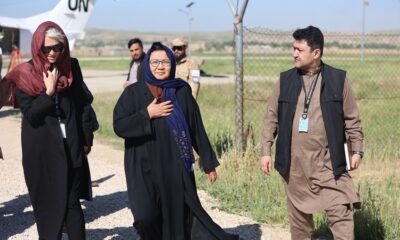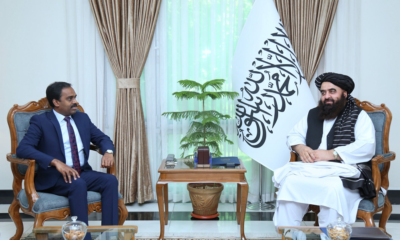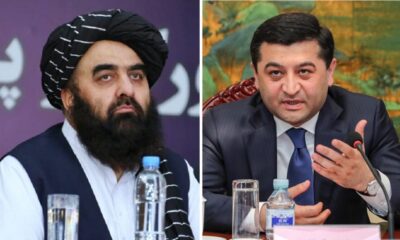Regional
Iran, US hold ‘positive’ talks in Oman, agree to resume next week
Araqchi said his delegation had a brief encounter with its U.S. counterpart headed by Witkoff, after they exited the talks.
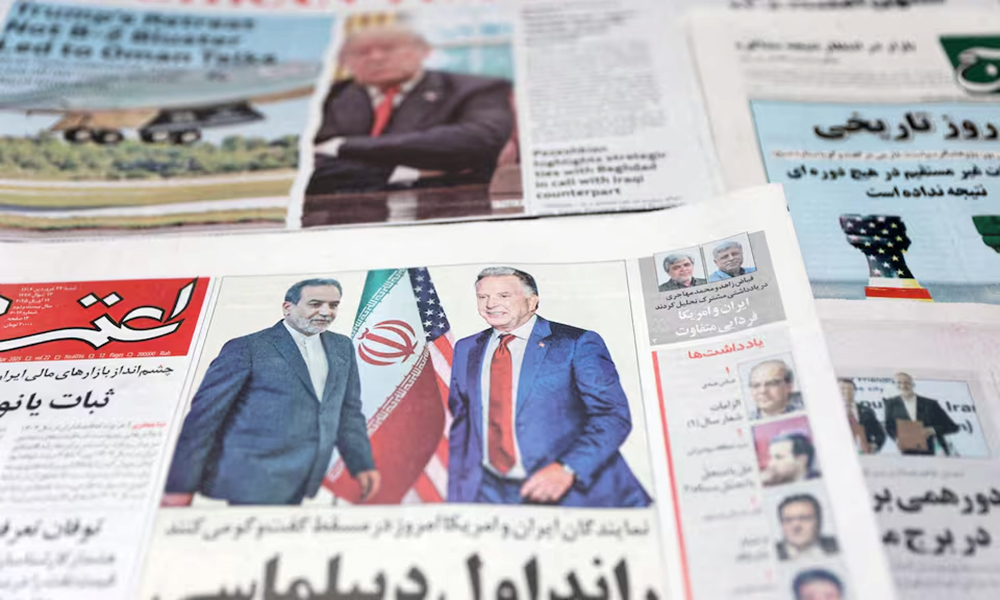
Iran and the U.S. said they held “positive” and “constructive” talks in Oman on Saturday and agreed to reconvene next week in a dialogue meant to address Tehran’s escalating nuclear programme, with President Donald Trump threatening military action if there is no deal, Reuters reported.
“I think we are very close to a basis for negotiations and if we can conclude this basis next week, we’ll have gone a long way and will be able to start real discussions based on that,” Iranian Foreign Minister Abbas Araqchi told state television.
Araqchi said the talks – the first between Iran and a Trump administration, including his 2017-2021 first term – took place in a “productive, calm and positive atmosphere”.
“Both sides have agreed to continue the talks … probably next Saturday,” Araqchi added. “Iran and the U.S. side want an agreement in the short term. We do not want talks for (the sake of) talks.”
The White House called the talks involving Trump’s Middle East envoy Steven Witkoff, U.S. Ambassador to Oman Ana Escrogima and Araqchi “very positive and constructive.”
“These issues are very complicated, and Special Envoy Witkoff’s direct communication today was a step forward in achieving a mutually beneficial outcome,” it said in a statement. “The sides agreed to meet again next Saturday.”
Asked about the talks, Trump told reporters on Saturday night: “I think they’re going OK.”
“Nothing matters until you get it done, so I don’t like talking about it, but it’s going OK. The Iran situation is going pretty good, I think,” he said on Air Force One.
Trump made a surprise announcement on Monday that Washington and Tehran would begin talks in Oman, a Gulf state that has mediated between the West and the Islamic Republic before. It has brokered the release of several foreign citizens and dual nationals held by Iran, read the report.
Saturday’s exchanges were indirect and mediated by Oman, as Iran had wanted, rather than face-to-face, as Trump had demanded. Each delegation had its separate room and exchanged messages via Oman’s foreign minister, according to Iranian Foreign Ministry spokesman Esmail Baghaei.
Araqchi said his delegation had a brief encounter with its U.S. counterpart headed by Witkoff, after they exited the talks.
“After the end of more than 2-1/2 hours of indirect talks, the heads of the Iranian and American delegations spoke for a few minutes in the presence of the Omani foreign minister as they left the talks. It (the encounter) was based on our political etiquette,” Araqchi said.
“The current focus of the talks will be de-escalating regional tensions, prisoner exchanges and limited agreements to ease sanctions (against Iran) in exchange for controlling Iran’s nuclear programme,” an Omani source told Reuters.
Baghaei denied this account but did not specify what was false.
Trump, who in his first term withdrew the U.S. from a 2015 big-power accord with Tehran, has again brought a tougher approach to a Middle Eastern power whose nuclear programme Washington’s ally Israel regards as an existential threat.
At the same time, Iran and allied groups have been weakened by the military offensives Israel has launched across the region, including air strikes in Iran, during its war with Hamas after the Palestinian militant group Hamas attacked Israel from Gaza in October 2023, Reuters reported.
Mikhail Ulyanov, Russia’s ambassador to international bodies in Vienna, called the statements issued by both sides after the talks “encouraging”.
Tehran approached the talks warily, sceptical they could yield a deal and suspicious of Trump, who has repeatedly threatened to bomb Iran if it does not halt its accelerating uranium enrichment programme – regarded by the West as a possible pathway to nuclear weapons.
While each side has talked up the chances of some progress, they remain far apart on a dispute that has rumbled on for more than two decades. Iran has long denied seeking nuclear weapons capability, but Western countries and Israel believe it is covertly trying to develop the means to build an atomic bomb.
“This is a beginning. So it is normal at this stage for the two sides to present to each other their fundamental positions through the Omani intermediary,” Baghaei said.
Signs of progress could help cool tensions in a region aflame since 2023 with wars in Gaza and Lebanon, missile fire between Iran and Israel, Houthi attacks on Red Sea shipping and the overthrow of the government in Syria.
However, failure would aggravate fears of a wider conflagration across a region that exports much of the world’s oil. Tehran has cautioned neighbouring countries that have U.S. bases that they would face “severe consequences” if they were involved in any U.S. military attack on the OPEC member.
“There is a chance for initial understanding on further negotiations if the other party (U.S.) enters the talks with an equal stance,” Araqchi told Iranian TV.
Iran’s Supreme Leader Ayatollah Ali Khamenei, who has the final say on key state matters, has given Araqchi “full authority” for the talks, an Iranian official told Reuters.
Iran has ruled out negotiating its defence capabilities such as its ballistic missile programme.
Western nations say Iran’s enrichment of uranium, a nuclear fuel source, has gone far beyond the requirements of a civilian energy programme and has produced stocks at a level of fissile purity close to those required in warheads.
Trump, who has restored a “maximum pressure” campaign on Tehran since February, ditched a 2015 nuclear pact between Iran and six world powers, including Russia and China, in 2018 during his first term and reimposed crippling sanctions on the Islamic Republic.
Since then, Iran’s nuclear programme has leaped forward, including by enriching uranium to 60% fissile purity, a technical step from the levels needed for a bomb.
Regional
Panic in Pakistan as India vows to cut off water supply over Kashmir
Islamabad has denied any role and said “any attempt to stop or divert the flow of water belonging to Pakistan … will be considered as an Act of War”.
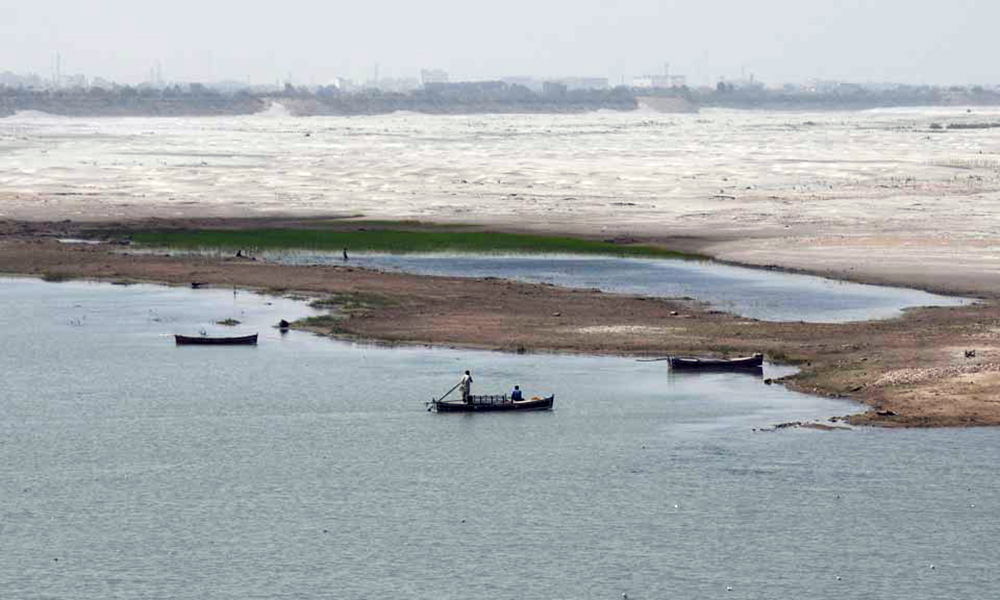
Pakistani farmers have voiced concern about future water supplies after India on Wednesday suspended the World Bank-mediated Indus Waters Tropy of 1960, which ensures water for 80% of Pakistan’s farms.
India said the suspension would last until “Pakistan credibly and irrevocably abjures its support for cross-border terrorism”.
This move comes after last week’s attack in Kashmir. India has accused Pakistan of having been involved, stating two of the three militants who attacked tourists and killed 26 men were from Pakistan.
Islamabad has denied any role and said “any attempt to stop or divert the flow of water belonging to Pakistan … will be considered as an Act of War”.
The treaty split the Indus and its tributaries between the nuclear-armed rivals.
Government officials and experts on both sides say India cannot stop water flows immediately, because the treaty has allowed it to only build hydropower plants without significant storage or dams on the three rivers allocated to Pakistan. But things could start changing in a few months, Reuters reported.
“We will ensure no drop of the Indus River’s water reaches Pakistan,” India’s water resources minister, Chandrakant Raghunath Paatil, said on X.
He did not respond to questions about the fears in Pakistan.
Two Indian government officials, who declined to be identified, said the country could within months start diverting the water for its own farms using canals while planning hydroelectric dams that could take four to seven years to finish.
Immediately, India will stop sharing data like hydrological flows at various sites of the rivers flowing through India, withhold flood warnings and skip annual meetings under the Permanent Indus Commission headed by one official each from the two countries, said Kushvinder Vohra, a recently retired head of India’s Central Water Commission.
“They will not have much information with them when the water is coming, how much is coming,” said Vohra, who was also India’s Indus Commissioner and now advises the government occasionally.
“Without the information, they cannot plan.”
And it is not just agriculture, a shortage of water will also hit electricity generation and potentially cripple the economy, economists say.
Vaqar Ahmed, economist and team lead with UK consulting firm Oxford Policy Management, said that Pakistan had underestimated the threat of India walking away from the treaty.
“India hasn’t got the kind of immediate infrastructure to halt the waterflows, especially during flood times, so this period creates a crucial window for Pakistan to address the inefficiencies in its water sector,” he said.
“There are a lot of inefficiencies, leakages.”
In recent years, Indian Prime Minister Narendra Modi’s government has been seeking to renegotiate the treaty and the two countries have been trying to settle some of their differences in the Permanent Court of Arbitration in the Hague over the size of the Kishenganga and Ratle hydroelectric plants’ water storage area, Reuters reported.
“We can now pursue our projects in free will,” said Vohra.
In a letter on Thursday, India told Pakistan that circumstances had changed since the treaty was signed, including population increases and the need for more cleaner energy sources, referring to hydropower.
Regional
Suspected chemical blast at Iran’s Bandar Abbas port kills at least 18, injures hundreds
President Masoud Pezeshkian ordered an investigation of the incident and sent to the site his interior minister, who said efforts were continuing to extinguish the fire and prevent it from spreading to other areas, read the report.
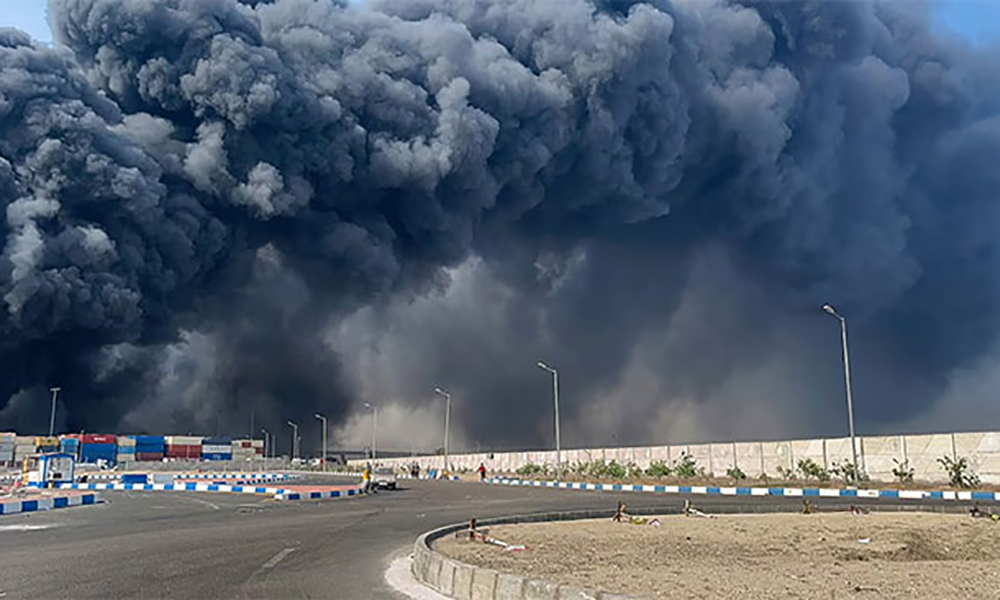
A huge blast probably caused by the explosion of chemical materials killed at least 18 people and injured more than 700 on Saturday at Iran’s biggest port, Bandar Abbas, Iranian state media reported.
The explosion, which hit the Shahid Rajaee section of the port, occurred as Iran began a third round of nuclear talks with the United States in Oman, but there was no indication of a link between the two events, Reuters reported.
Hossein Zafari, a spokesperson for Iran’s crisis management organisation, appeared to blame the explosion on poor storage of chemicals in containers at Shahid Rajaee.
“The cause of the explosion was the chemicals inside the containers,” he told Iran’s ILNA news agency.
“Previously, the Director General of Crisis Management had given warnings to this port during their visits and had pointed out the possibility of danger,” Zafari said.
However, an Iranian government spokesperson said that although chemicals had likely caused the blast, it was not yet possible to determine the exact reason.
President Masoud Pezeshkian ordered an investigation of the incident and sent to the site his interior minister, who said efforts were continuing to extinguish the fire and prevent it from spreading to other areas, read the report.
Iran’s official news channels aired footage of a vast black and orange cloud of smoke billowing up above the port in the aftermath of the blast, and an office building with its doors blown off and papers and debris strewn around.
Located near the strategic Strait of Hormoz, Shahid Rajaee port is Iran’s biggest container hub, handling a majority of the country’s container goods, according to state media.
The blast shattered windows within a radius of several kilometres and was heard in Qeshm, an island 26 kilometres (16 miles) south of the port, Iranian media said.
The semi-official Tasnim news agency posted footage of injured men lying on the road being tended to amid scenes of confusion.
State TV earlier reported that poor handling of flammable materials was a “contributing factor” to the explosion. A local crisis management official told state TV that the blast took place after several containers stored at the port exploded.
As relief workers tried to put out fires, the port’s customs officials said trucks were being evacuated from the area and that the container yard where the explosion occurred likely contained “dangerous goods and chemicals”. Activities at the port were halted after the blast, officials said.
A series of deadly incidents has hit Iranian energy and industrial infrastructure in recent years, with many, like Saturday’s blast, blamed on negligence.
They have included refinery fires, a gas explosion at a coal mine, and an emergency repair incident at Bandar Abbas that killed one worker in 2023.
Iran has blamed some other incidents on its arch-foe Israel, which has carried out attacks on Iranian soil targeting Iran’s nuclear programme in recent years and last year bombed the country’s air defences.
Tehran said Israel was behind a February 2024 attack on Iranian gas pipelines, while in 2020 computers at Shahid Rajaee were hit by a cyberattack. The Washington Post reported that Israel appeared to be behind that incident as retaliation for an earlier Iranian cyberattack, Reuters reported.
Israel has indicated it is nervous about the outcome of U.S.-Iran talks, demanding a full dismantlement of Iran’s nuclear programme. Tehran says the programme is used solely for peaceful purposes, while international observers say it is getting closer to being able to build a bomb.
There was no immediate comment from Israel’s military or Prime Minister Benjamin Netanyahu’s office when asked for comment on whether Israel was in any way involved in Saturday’s explosion.
Oil facilities were not affected by the blast on Saturday, Iranian authorities said.
The National Iranian Petroleum Refining and Distribution Company said in a statement it had “no connection to refineries, fuel tanks, distribution complexes and oil pipelines.”
Regional
At least 47 injured after explosion at port in Iran’s Bandar Abbas
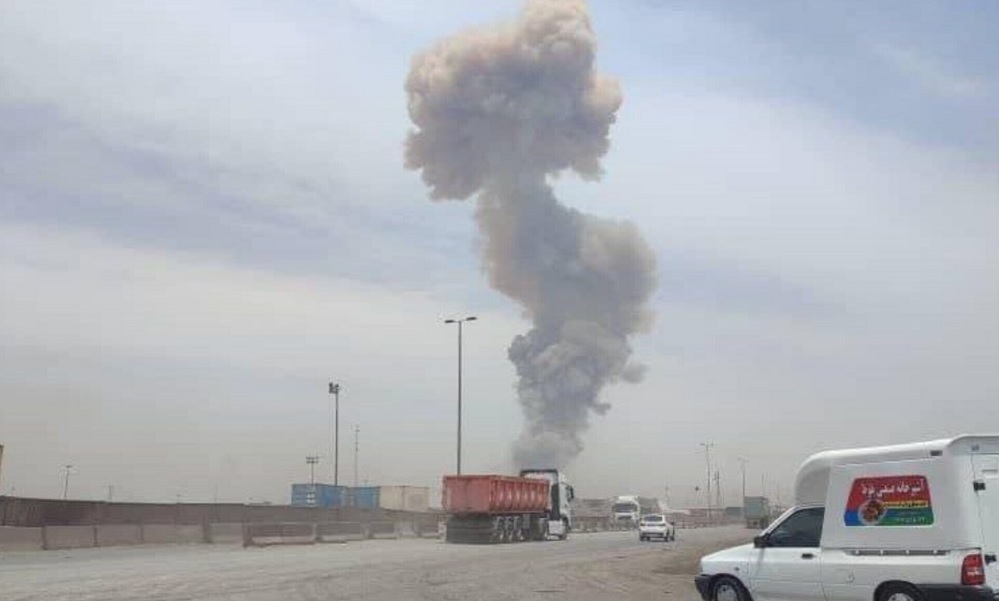
A large explosion rocked Shahid Rajaee port in the southern Iranian city of Bandar Abbas on Saturday, with at least 47 people injured after the blast, state media reported.
The blast occurred as Iran began a third round of nuclear talks with the United States in Oman, although the cause of the explosion was not immediately clear, Reuters reported.
“The cause of this incident was the explosion of several containers stored in the Shahid Rajaee Port wharf area. We are currently evacuating and transferring the injured to medical centres,” a local crisis management official told state TV.
Fars news agency reported that 47 people were injured according to initial estimates.
Semi-official Tasnim news agency added that the port’s activities were suspended to extinguish the fire and that considering the large number of port employees “many people were probably injured or even killed in the incident.”
The blast shattered windows within a radius of several kilometres, Iranian media said, with footage shared online showing a mushroom cloud forming following the explosion.
In 2020, computers at the same port were hit by a cyberattack that caused massive backups on waterways and roads leading to the facility. The Washington Post had reported that Iran’s arch-foe Israel appeared to be behind that incident as retaliation for an earlier Iranian cyberattack.
-

 Sport4 days ago
Sport4 days agoSri Lanka A defeats Afghanistan A by 4 wickets in Abu Dhabi
-

 Business5 days ago
Business5 days agoAfghanistan’s growth prospects remain uncertain amid global uncertainty: World Bank report
-
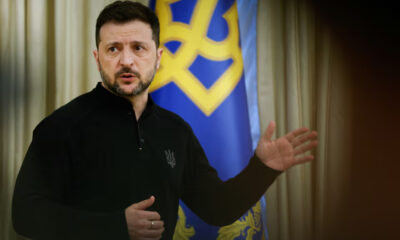
 World5 days ago
World5 days agoUkraine ready to hold talks with Russia once ceasefire in place, Zelenskiy says
-

 Latest News4 days ago
Latest News4 days agoAWCC activates new site in Nangarhar’s Kuz Kunar district
-

 Latest News4 days ago
Latest News4 days agoTarig Ali Bakheet and Japan’s Deputy Foreign Minister discuss Afghanistan’s situation
-

 Climate Change5 days ago
Climate Change5 days agoPowerful earthquake of 6.2 magnitude shakes Istanbul
-

 Business4 days ago
Business4 days agoPakistan’s deputy PM discusses Trans-Afghan Railway Line project with Uzbek FM
-

 Latest News5 days ago
Latest News5 days agoSpecial meeting will be held to launch Afghanistan–Russia joint commission, says Kabulov


